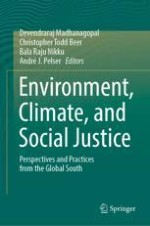2022 | OriginalPaper | Buchkapitel
Climate Risks in an Unequal Society: The Question of Climate Justice in India
verfasst von : Devendraraj Madhanagopal, Vidya Ann Jacob
Erschienen in: Environment, Climate, and Social Justice
Verlag: Springer Nature Singapore
Aktivieren Sie unsere intelligente Suche, um passende Fachinhalte oder Patente zu finden.
Wählen Sie Textabschnitte aus um mit Künstlicher Intelligenz passenden Patente zu finden. powered by
Markieren Sie Textabschnitte, um KI-gestützt weitere passende Inhalte zu finden. powered by
